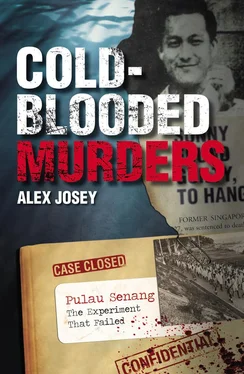Alex Josey - Cold blooded murders
Здесь есть возможность читать онлайн «Alex Josey - Cold blooded murders» весь текст электронной книги совершенно бесплатно (целиком полную версию без сокращений). В некоторых случаях можно слушать аудио, скачать через торрент в формате fb2 и присутствует краткое содержание. Жанр: Криминальный детектив, на английском языке. Описание произведения, (предисловие) а так же отзывы посетителей доступны на портале библиотеки ЛибКат.
- Название:Cold blooded murders
- Автор:
- Жанр:
- Год:неизвестен
- ISBN:нет данных
- Рейтинг книги:5 / 5. Голосов: 1
-
Избранное:Добавить в избранное
- Отзывы:
-
Ваша оценка:
- 100
- 1
- 2
- 3
- 4
- 5
Cold blooded murders: краткое содержание, описание и аннотация
Предлагаем к чтению аннотацию, описание, краткое содержание или предисловие (зависит от того, что написал сам автор книги «Cold blooded murders»). Если вы не нашли необходимую информацию о книге — напишите в комментариях, мы постараемся отыскать её.
Cold blooded murders — читать онлайн бесплатно полную книгу (весь текст) целиком
Ниже представлен текст книги, разбитый по страницам. Система сохранения места последней прочитанной страницы, позволяет с удобством читать онлайн бесплатно книгу «Cold blooded murders», без необходимости каждый раз заново искать на чём Вы остановились. Поставьте закладку, и сможете в любой момент перейти на страницу, на которой закончили чтение.
Интервал:
Закладка:
In the third stage, detainees would be moved back to Singapore to live in open security camps, in which they would be employed, at equitable rates of pay, on constructive projects designed to emphasise the contribution that could be made in the community. Friends and relatives could visit them and in this way, detainees could become progressively accustomed to normal society. The committee recognised that their stay on Pulau Senang would have accustomed them to a decidedly artificial way of living: they would have had no contact with normal society, particularly feminine society.
In the fourth stage, detainees would be released subject to supervision by the police or an after-care officer. The committee recommended that the only necessary conditions for release should be that the detainee was considered to have reformed to the extent that he was unlikely to return to gangsterism, and that permanent and regular employment was available for him.
The report of the Ad Hoc Committee was endorsed by the Commissioners. Jek, one of the members of the Ad Hoc Committee, later successfully fought a parliamentary election and became a Minister in Lee Kuan Yew’s cabinet. The other former detainee, S. Woodhull, was arrested again, this time by the Internal Security Council (consisting of representatives of the Malaysian, the British and the Singapore Governments) and detained. When released, he continued his legal studies in England and later practised law in Malaysia.
No time was lost by the Commissioners in approving this scheme and forwarding it to the government. It was acted upon without delay. By May 1960, long before the Commissioners had completed their overall inquiry into the prison system, the Pulau Senang Scheme was in operation. Hundreds of gangsters were working on the island, creating something of their own, and, in this way, through toil and sweat, earning the right, the Commissioners hoped, to take their place in the community of useful citizens. This was the experiment that failed.
Criticism
Pulau Senang was not without its critics. In the Assembly in June 1963 (a month before the revolt on the island), the former Chief Minister, David Marshall (15 years later to become Singapore’s first Ambassador in Paris), complained that the government was ‘using persons who have not been convicted by any courts, as slave labour’. They were paid very little. He said they should be paid trade union rates and their families should be supported by the government. Marshall said he had visited the island and he came away with a very strong impression of an aura of fear in all those detainees, an aura of helplessness and hopelessness, “because they are so utterly at the mercy of every minor official on that island. Their release or their continued detention is at the whim of officials and is no longer subject to law. They are beyond the pale of the law.” He thought it a very unhealthy atmosphere, and went on to say that he found it difficult to understand “whether, in fact, bringing these people in close propinquity over a long period, subject to not merely superior discipline of the officers from the prisons but the discipline of their own groups, does not build an esprit de corps which could endanger our peace, if in fact they are, as I have no doubts some of them are, drawn from secret society gangs.”
The Home Minister, Ong Pang Boon, reminded Marshall that the previous government had no scheme for rehabilitating secret society gangsters: they just locked them up three to a cell. When the People’s Action Party came to power, this state of affairs was considered undesirable, and Pulau Senang was being tried as an experiment. Only time could tell whether it would be a success. The Minister claimed that the results to date were encouraging.
As for an aura of fear at Pulau Senang, Marshall might have found sullen detainees because the week before, several warders had been assaulted and the detainees involved had been punished. The Minister said he had visited the island several times and found no aura of fear. As for the dependants of the detainees, they could always apply for aid to the Social Welfare Department.
Marshall explained that he was not criticising the concept of Pulau Senang: he thought the experiment a good one. What he criticised was the use of the detainees as slave labour. He had been impressed by the very considerable assets in buildings, vegetable gardens, irrigation works and the provision for water, which were constructed by the detainees. His submission was that if a man is made to work, he should be paid full wages, deducting there from the cost of his enforced lodging and the cost of his board. They did not even have a canteen. They could not order a cup of coffee. “Gangster or no gangster, Sir, if you are trying to attract them to a human way of life, I would suggest a proper approach, and from the point of view of socialists and persons who believe in the trade union movement, I resent the suggestion of using persons detained by executive act, as slave labour.”
The Home Minister told the House that canteen facilities were available: they could purchase cigarettes and tobacco, toilet articles, confectionery and groceries. Arrangements for meals and drinks were being made. He denied Marshall’s charge that the detainees had no alternative but to volunteer for work: he insisted that the work was of a voluntary nature, regarded and accepted as part of their training and rehabilitation process. “In their case work has a therapeutic meaning, and wages are a secondary matter.” He agreed that detainees had been told that if they want to secure their early release they must go to Pulau Senang. That was accepted. Only through work at Pulau Senang, his general behaviour there, could it be known if the gangster had reformed.
Dr Goh Keng Swee, then Minister for Finance, poured ridicule on Marshall’s suggestion that detainees should be paid the rate for the job. He accused Marshall of trying to make political capital out of Pulau Senang. His suggestion that the government was employing slave labour in Pulau Senang, the Minister described as ‘completely sanctimonious humbug’. Pulau Senang was a scheme to rehabilitate secret society gangsters. “It is not a matter of the wicked government catching innocent people and putting them to do some slave work for the benefit of the party or the government.”
Were the government ‘so absurd, so ridiculous’ as to accept Marshall’s proposal that the detainees should be paid the rate for the job, this surely would be an invitation to the public to join secret societies and thereby get a remunerative career in Pulau Senang, with food and everything thrown in. The Minister insisted that the main thing was to impress upon the detainees that work is creative and is of value to society, and to inculcate in these unfortunate young men pride in work, and a sense of social responsibility.
Marshall was stung to reply. “Who can speak of pride in work, being paid $0.30 a day whilst your family starves on social welfare pittance,” he thundered, “… whilst their families starve, they sweat at hard labour in the sun with pick and shovel and get paid by this beneficent government $0.30 a day. Mr Speaker, what kind of self-respect do you think you can build in a human being like that? What kind of attitude do you think you can build in a human being like that towards a society which treats him in that fashion?” Not one of these men, he reminded the House, had been convicted by an impartial judge.
The Prime Minister intervened to recall that he had spent a ‘rather exciting evening’ at the Aftercare Association, when the Superintendent of Pulau Senang had provided a concert consisting of ex-detainee performers. He urged Marshall to lend his patronage to this very deserving Aftercare Association. The Home Minister made two further points: all detainees were paid $0.30 a day, which was higher than the rate paid to convicted prisoners. In about three years, nearly 400 detainees had been successfully rehabilitated at Pulau Senang. Up to the end of 1962, the total cost of the upkeep of Pulau Senang was $1,110,495. Some $30,677 had been paid to the detainees for work done.
Читать дальшеИнтервал:
Закладка:
Похожие книги на «Cold blooded murders»
Представляем Вашему вниманию похожие книги на «Cold blooded murders» списком для выбора. Мы отобрали схожую по названию и смыслу литературу в надежде предоставить читателям больше вариантов отыскать новые, интересные, ещё непрочитанные произведения.
Обсуждение, отзывы о книге «Cold blooded murders» и просто собственные мнения читателей. Оставьте ваши комментарии, напишите, что Вы думаете о произведении, его смысле или главных героях. Укажите что конкретно понравилось, а что нет, и почему Вы так считаете.












